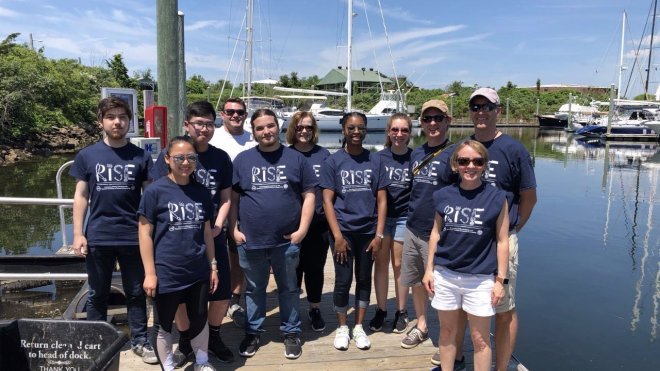A “warm-up” before Fall semester starts: Summer Bridge Program Launches First Group of RISE Scholars
Summer Bridge residential program gets students acclimated to campus life and thinking about STEM communication

Bristol, R.I. –It's summer, but school was in session for six scholars at Roger Williams University.
Eight hours a day, for eight days, they were learning Science, Technology, Engineering and Mathematics (STEM) communication, visiting professional research labs, and getting to know the campus and surrounding community by bonding through icebreakers and s’mores.
This is the Summer Bridge program for RISE Scholars at RWU, a full-time residential program designed to transition first-year students to college life and to excite all new RISE scholars for college-level STEM curricula.
Established through a grant from The National Science Foundation’s Scholarships in Science, Technology, Engineering, and Mathematics, the RISE Scholars program includes a $10,000 scholarship for students with academic talent and financial need. The scholarship is for up to four consecutive years of undergraduate study and includes involvement in a co-curricular program that seeks to develop the expertise of students in preparation for successful careers in STEM fields. Throughout the program, RISE Scholars receive mentoring and advising, career development, research and internship opportunities, and travel stipends to attend and present research at academic conferences.

The inaugural 2019 cohort includes five freshman, one sophomore, and one junior representing majors ranging from forensic science to computer science, marine biology, engineering, and applied math.
The intensive summer program packed in a week of STEM academic instruction to help them think about future research questions and develop projects through their next few years.
"We're here to support students as they explore the STEM fields and apply their skills to develop solutions in their careers in research and industry in science and engineering," said Associate Professor of Engineering Bill Palm.

Led by Principal Investigators Tracey McDonnell Wysor, Brian Wysor, Bill Palm and Karen Bilotti, the Summer Bridge program guided students through a faculty-mentored research project, fieldwork on RWU’s research vessel, and a behind-the-scenes tour of the university’s new SECCM Labs under construction. The students also learned from a variety of experts such as scientists and engineers at Woods Hole Oceanographic Institution (WHOI).
The hands-on learning opportunities made a strong impact on Mackenzie Conner, an incoming freshman engineering major and RISE Scholar. The most exciting experiences were going out to the local shoreline and learning about how Clean Ocean Access’ debris skimmers filter the saltwater and trap garbage like food wrappers and cigarettes as well as organic matter. At the end of the week, RISE scholars concluded their work by presenting their research to faculty and local STEM professionals.

“This week has shown me how much all these disciplines need to work together to solve a problem,” said Conner. “In our group, I was the only engineering major, but there were marine bio. and computer science majors, and the faculty were all from different backgrounds. At a lot of the places we visited, like WHOI, have many people working there from all different backgrounds. It taught me how someone with a bio. background and someone with engineering background can come together to solve a problem.”
While the academic preparation will serve her well as she embarks on her next four years at RWU, the program also helped prepare her for college life.
"I have a better expectation of what I'm walking into,” Conner said. “Although I didn’t get to meet my specific professors, I was able to meet a few other professors, and to be able to have that connection makes it easy to see myself sitting in a classroom with a professor in a college setting. Through this program, I will have a strong support system throughout my four years and have more connections and resources that will prepare me for internships and getting involved in research which will in turn give me a more successful future."